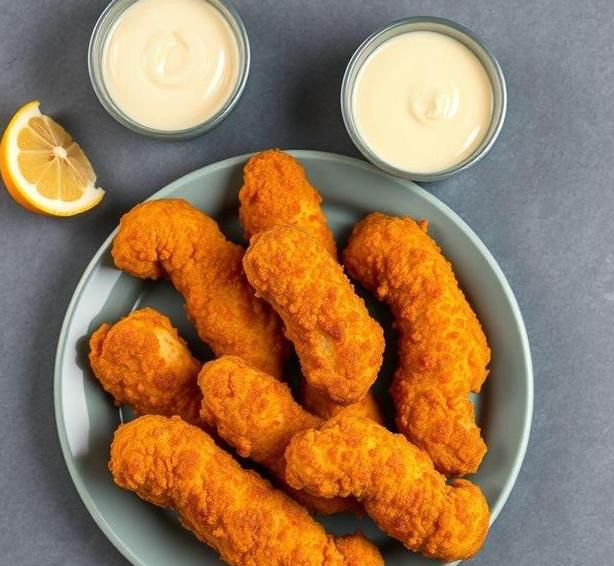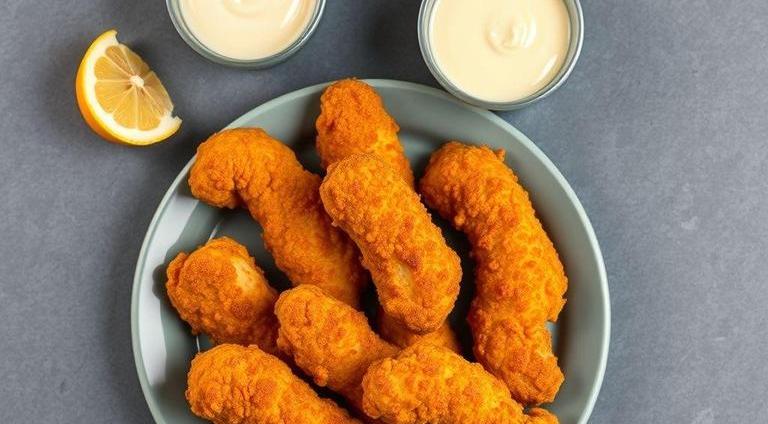Chicken goujons-crispy, golden, and often paired with a tangy dipping sauce-are a popular snack or meal option for many. Whether you’re grabbing them as a quick dinner, tossing them into a salad, or dipping them into your favorite sauce, they bring a satisfying crunch with every bite. But like any other food, chicken goujons are not impervious to the forces of time and environment. So, if you’ve got some leftover in the fridge or have been holding onto a frozen batch for a while, you might be wondering: Can chicken goujons go bad?
It’s a great question, especially when it comes to ensuring the safety of your food and avoiding any unwanted stomach troubles. In this guide, we’ll dive deep into how long chicken goujons last, the common signs of spoilage, and how best to store them. Plus, we’ll sprinkle in a few expert tips to keep your goujons crispy and fresh for as long as possible. So, let’s get into it!
Can Chicken Goujons Go Bad?
Yes, chicken goujons can absolutely go bad! Since they’re made from chicken, which is a perishable food item, they are vulnerable to bacteria growth, spoilage, and changes in texture or taste. While they might look fine at first glance, there are several factors that can affect their freshness-whether they’re cooked, raw, or frozen.
Chicken is one of those proteins that can quickly spoil when left out at room temperature, or if stored improperly in the fridge or freezer. Once they’ve crossed that threshold of "freshness," you’ll likely notice a change in taste, smell, or appearance. And that’s where food safety becomes crucial.
Here’s a quick rundown of what causes chicken goujons to go bad:
- Bacterial Growth: Bacteria like Salmonella and Campylobacter thrive in chicken, especially if it’s improperly stored. When left at room temperature for too long, these bacteria can cause foodborne illnesses.
- Freezer Burn: If your goujons are frozen for too long, they might suffer from freezer burn, which alters the taste and texture of the chicken, making them less enjoyable to eat.
- Dehydration or Dryness: Even if your chicken goujons don’t go bad outright, improper storage can cause them to dry out or lose their crispy texture.
So, while chicken goujons can last a good while if stored properly, they absolutely can go bad over time.
Shelf Life For Chicken Goujons

The shelf life of chicken goujons varies depending on how they’re stored, whether they’re cooked or uncooked, and whether they’re fresh or frozen. Let’s break down the details:
-
Cooked Chicken Goujons (Refrigerated)
When stored in an airtight container in the fridge, cooked chicken goujons generally last about 3 to 4 days. After that, the risk of spoilage increases due to bacteria growth, even if they still look fine.
-
Frozen Chicken Goujons
If you have some chicken goujons in the freezer, they can last significantly longer. Frozen cooked chicken goujons can last up to 4 months in the freezer without major changes in taste or texture, although it’s best to eat them within 2 to 3 months for optimal quality.
-
Uncooked Chicken Goujons
If your goujons are uncooked and raw, they should be cooked within 1 to 2 days if refrigerated. If frozen, uncooked goujons can last up to 6 months, although, like with cooked ones, the quality is best if eaten within 3 months.
Common Signs Of Spoilage
So, how do you know when chicken goujons have gone bad? There are a few telltale signs that can help you determine whether or not they’re safe to eat. You should always trust your senses (sight, smell, and touch) when deciding if food has gone bad, and here’s what to look out for:
-
Smell
This is one of the most obvious indicators. Fresh chicken goujons have a mild, neutral smell when they’re cooked. If they have a sour, rancid, or "off" smell, they’ve likely spoiled. Trust your nose here-don’t risk it!
-
Texture
After storage, if your chicken goujons feel slimy or unusually sticky, that’s a bad sign. The texture might also become mushy or overly soft if the chicken is going bad, especially if it was left in the fridge too long. Fresh goujons should remain relatively firm to the touch.
-
Discoloration
If you see any spots of discoloration, like darkening or browning (particularly around the edges), that’s an indication the goujons have begun to spoil. It’s especially important to keep an eye on frozen goujons-if you notice large patches of ice or frost on them, it may indicate freezer burn.
-
Taste
While you may not want to taste a potentially spoiled goujon, if you ever do by accident and it tastes sour, metallic, or off in any way, discard it immediately. The taste will usually change long before you notice any physical changes.
How To Store Chicken Goujons?
The key to extending the life of your chicken goujons is all about proper storage. Let’s take a closer look at how you can store both cooked and uncooked chicken goujons to maximize their shelf life:
For Cooked Chicken Goujons

-
Refrigeration
- Store your cooked goujons in an airtight container or tightly wrapped in plastic wrap or aluminum foil.
- They should be placed in the fridge as soon as they cool down to room temperature, ideally within two hours of cooking.
- Keep your fridge at or below 40°F (4°C) to minimize bacterial growth.
-
Freezing
- If you plan to store your cooked goujons for longer than 3-4 days, freezing is your best option.
- To prevent freezer burn, wrap each goujon individually in plastic wrap or wax paper, and then place them in a zip-lock freezer bag or airtight container.
- Label the bag with the date, so you can keep track of how long they’ve been frozen.
For Uncooked Chicken Goujons
-
Refrigeration
- Uncooked goujons should be used within 1-2 days of purchase. Store them in a tightly sealed container or wrapped tightly in plastic.
-
Freezing
- If you don’t plan to cook them soon, freezing is your best option. As with cooked goujons, wrap each one individually, then store them in a freezer-safe container or bag.
- You can also freeze them in a single layer on a baking sheet before transferring them to a bag, ensuring they don’t stick together.
Expert Tips
-
Label & Date Everything
Keep track of when you stored your chicken goujons, especially if you’ve frozen them. It’s easy to forget how long something has been in the freezer, so labeling helps you maintain freshness.
-
Avoid The "Two-Hour Rule"
As a general food safety guideline, avoid leaving cooked chicken goujons (or any perishable food) out at room temperature for more than two hours. This time is shortened to just one hour if the room temperature is over 90°F (32°C). Bacteria can multiply quickly within this time frame.
-
Reheat Properly
When reheating leftover chicken goujons, be sure they reach an internal temperature of 165°F (74°C) to kill any lingering bacteria and ensure they’re safe to eat.
-
Use A Vacuum Sealer For Freezing
If you often freeze food, investing in a vacuum sealer can help extend the shelf life of chicken goujons (or any frozen food) by eliminating air, which causes freezer burn.
FAQs
Can Chicken Goujons Go Bad If Left Out At Room Temperature?
Yes, chicken goujons can go bad if left out at room temperature for more than two hours. Bacteria can grow rapidly at temperatures between 40°F and 140°F (4°C and 60°C), increasing the risk of foodborne illness.
How Long Can Cooked Chicken Goujons Last In The Fridge?
Cooked chicken goujons can last 3-4 days in the fridge when stored properly in an airtight container. Be sure to refrigerate them within two hours of cooking.
Can Chicken Goujons Be Frozen?
Yes, chicken goujons can be frozen for up to 3-4 months. To preserve their quality, wrap them tightly in plastic wrap or foil and place them in a freezer-safe bag or container.
How Can You Tell If Chicken Goujons Have Gone Bad?
Signs that chicken goujons have gone bad include an off smell, a slimy texture, or a change in color (such as turning grayish or green). If you notice any of these signs, it’s best to discard them.
Can Chicken Goujons Go Bad After Being Frozen?
Although freezing chicken goujons can extend their shelf life, they may lose texture and flavor after being stored for too long. It is best to consume frozen goujons within 3-4 months for optimal quality.
What Happens If You Eat Spoiled Chicken Goujons?
Eating spoiled chicken goujons can result in food poisoning. Symptoms may include nausea, vomiting, stomach cramps, and diarrhea, caused by bacteria such as Salmonella or Campylobacter.
Can You Reheat Chicken Goujons After They’ve Been Stored In The Fridge?
Yes, you can reheat chicken goujons after they’ve been stored in the fridge. However, ensure they are heated to at least 165°F (74°C) to kill any bacteria that may have developed during storage.
Do Chicken Goujons Need To Be Cooked Immediately After Thawing?
Yes, chicken goujons should be cooked immediately after thawing to prevent bacterial growth. Never refreeze chicken goujons that have been thawed, as this can lead to a loss of quality and potential contamination.
Can Chicken Goujons Go Bad If They’re Dipped In Batter Before Cooking?
Yes, if chicken goujons are dipped in batter and left uncooked for an extended period, they can spoil. Batter can trap moisture, which may promote bacterial growth. Store uncooked goujons in the fridge if you’re not cooking them right away.
Can You Eat Chicken Goujons That Are Past Their Use-by Date?
It’s not recommended to eat chicken goujons past their use-by date, as they may pose a food safety risk. The use-by date indicates the last day the product should be consumed for safety reasons, especially when dealing with perishable items like chicken.